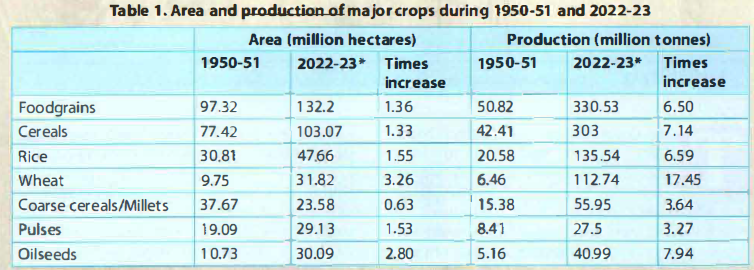Contents
| For 7PM Editorial Archives click HERE → |
Introduction
Agriculture infrastructure plays a vital role at every single step in agriculture like supply of input, sowing of crops and the post-harvest management. Indian government has taken several steps in recent years for the development of a resilient agriculture infrastructure in India.
What is agriculture infrastructure and what are its advantages?
Agriculture Infrastructure refers to the diverse systems and network of resources that are vital to produce, preserve, process, procure and trade agricultural products.
Advantages of agricultural infrastructure
1. Increase of the agricultural productivity- Developed agricultural infrastructure ensures proper availability of agricultural inputs like seeds, water etc. This has increased agricultural production in India over the decades.

2. Reduction of post-harvest losses- The construction of basic post-harvest agriculture infrastructures like storage houses, pack houses, proper supply chain etc. reduce the post-harvest losses.
3. Increase in farmers Income- Agricultural marketing infrastructures like APMC, e-NAM help in better price realisation of farmer’s produce.
What are the challenges of agriculture infrastructure in India and what have been the various government initiatives ?
| Agri Process/Inputs | Infrastructural Challenges | Government Initiatives |
| Seed | Availability and affordability of quality certified seeds | Establishment of ‘Community seed Banks‘. Push to create the infrastructure for seed storage and distribution through the Seed Act and PPVFR Act. |
| Fertilisers | Production, storage, distribution and disproportionate use of fertilisers. | ‘New Urea Policy 2015’– Aims to increase indigenous urea production. Soil Health Card and Neem coated Urea– To promote the proportionate use of Urea. DBT through PoS Machines- The infrastructure is to stop fertiliser subsidy leakages. |
| Irrigation | 53% area is rain fed and there is acute shortage of irrigation infrastructure. | Pradhan Mantri Krishi Sinchai Yojana (PMKSY) & Mahatma Gandhi National Rural Employment Guarantee Act (MGNREGA)– Asset creation for irrigation. Interlinking of Rivers– Ex-Ken-Betwa interlinking Rain water Harvesting, Participatory Irrigation Management- Govt has been creating the infrastructure to improve water use efficiency for agriculture. |
| Agricultural credit | Lack of access to credit due to less banks and credit lending institutions in rural areas. | Lead Bank Scheme and Service area approach– To increase the presence of banking infrastructure in rural areas. Promotion of Micro-finance institutions (MFIs)- Micro-finance institutions have been promoted to provide improved access to credit infrastructure. |
| Agricultural Storage | Poor farm Storage facilities Concentration of cold storages in few states(CAG- 64% in Punjab, Haryana,UP) Shortage of ripening Chambers, pack houses and cold storages. More than 30% of the produce from farm gate is lost due to inadequate cold chain infrastructure. | Agriculture Infrastructure Fund- It was launched in 2020 to create required pre and post-harvest management infrastructures in the agriculture sector. Mission for Integrated Development of Horticulture (MIDH)- Post-Harvest Management Infrastructure including cold storage, cold room facilities for horticultural produce. Negotiable Warehouse Receipts (NWRs)- Farmers can seek loans from banks against the warehouse receipts issued to them against their storage. |
| Agricultural Marketing | Issues with the infrastructure of APMC like lack of assaying & grading facilities, increased cost of transportation to get the crops to Mandis, less space in APMC Mandi for sale of crops. | Electronic National Agricultural Market (E-NAM)- Pan India electronic trading platform which aims to create a seamless, unified national market for agricultural produce. Model Agricultural Produce and Livestock Marketing (APLM) Act 2017- Setting up private wholesale market yards. Reduce the area covered by APMC mandi from 462 sq.km to 280 sq.km to reduce the cost of transportation. |
| E-Tech for Agricultural Extension | Lack of proper infrastructure for adoption of E-tech in agriculture. | m-KISAN portal, Meghdoot App- These E-tech infrastructures have been created to increase the agricultural production. |
Read More- Agricultural Technology
What Should be the way forward to further improve agriculture Infrastructure in India?
Increase the private sector investment in Agri-Infra- Ashok Dalwai Committee has suggested treating ‘agriculture as an enterprise’. Thus efforts must be taken to catalyse private investments through contract farming, agricultural marketing. This will help in development of world class infrastructure.
Improvement of Agri-futures markets- China and US have properly developed Agri-futures markets which has helped in improvement of their agricultural infrastructure. The deepening of Agri-markets in India would yield the same result.
Implementation of Shantakumar Committee Recommendations- Improving the private sector involvement in Building Silos, development of Dedicated freight corridors and multi-modal logistics park are some of the recommendations of Shantakumar committee to improve the transport and marketing infrastructure of agri-produce.
Early completion of Bharat Net Project and impartation of digital literacy to farmers- The future of agriculture depends upon the robust digital infrastructure. E-Tech projects like Kisan Suvidha App, Meghdoot App can spur development, growth, equity and sustainability of agriculture sector.
| Read More- Indian Express UPSC Syllabus- Food Processing and Related Industries in India- Scope and Significance, Location, Upstream and Downstream Requirements, Supply Chain Management. |
Discover more from Free UPSC IAS Preparation Syllabus and Materials For Aspirants
Subscribe to get the latest posts sent to your email.





